KATY COWAN





“They were as numerous as the people who walked the streets. They stood on the top of the highest towers, lay down on stone tombs, sat on horseback, kneeled, prayed, fought animals and wars, danced, drank wine and read books made of stone…Some wore costumes of other periods, and some no clothes at all.”1
—Anaïs NinIn the opening chapter of Anaïs Nin’s Collages, a woman remembers how she observed the statues of the city as a child—their gaze, their posture, their frozen gestures—as witnesses to the actions that have and continue to unfold around her. Sometimes their a itudes change. The figures come to mean something different as contemporary life alters how they are perceived. These silent spectators are described as lovers, enemies, and confidantes amid the public squares, upon the façades of buildings, and within parks visible from her bedroom window. At night, away from the light of the sun that petrifies them, they come alive in her dreams.
“Their silence by day taught her to read their frozen lips as one reads the messages of deaf mutes.”2
The woman is a painter. She believes the statues hold secrets, that there is another world in which they are animate. When separated from our gaze, they feel and act like us, touched by nature and industry.
“On rainy days their granite eye sockets shed tears mixed with soot.”3
1. Anaïs Nin, Collages (Athens: Swallow Press, 1964), 1.
2. Nin, Collages, 1.
3. Ibid.
The newest body of work by Katy Cowan indicates a similar sensitivity toward the figurative sculptures that populate many European cities, in this case Berlin, alongside other inert passages of stone (barriers, buildings) that look onto contemporary daily life. She watches them as strangers on the street, remarking how they relate to one another. “Through the crevices of bent arms, arched backs, proud and humble chins, repose, strength, love, fear, disinterest, I watch the seasons change, the clouds move through them, people of Berlin coming and going—resting, reposing, drinking, laughing, and the city humming by. They remain,” writes Cowan. “I feel their bodies, their emotions, their changes in a itude, their lives. Sometimes they are so fluid, and sometimes so cold.”4
“She was convinced that people did not die, they became statues.”5
For Cowan, two specific references are disclosed within the collection of works that constitute her exhibition gods on a bridge—remnants of the Berlin Wall that still stand as a token of the former division between East and West, and a bridge in Schöneberg’s Rudolph-Wilde-Park whose Neoclassical statuary depicts the mythological figures of Triton and Nymph in various poses and configurations across its parapets. One marks a path open to travel, punctuated by tableaux of a romantic couple that unfolds in scenes as one walks across; the other a symbolic remainder of the hinderance of movement, a relic of the obstruction now covered with layer upon layer of graffiti. Neither is static, each bears the marks of Berlin’s war-torn history still visible in the architecture in distinctive formal ways. Statues marred by bombs, concrete pockmarked by shards of shrapnel and bullets. Cowan replicates these indications of the built environment’s exposure to violence within the structural elements of her wallbased reliefs—punctures that wound any segments of smooth surface.
Assembled from shapes of jagged cardboard used for architectural modeling, tape, and rope, that burn away a er being exposed to the molten elements during the forging process, Cowan’s cast aluminum supports are painted in swathes of monochromatic grayscale, reminiscent of concrete, whose ground is interrupted by brazen markings. Across the ebullient compositions, these highly saturated and neon hues jolt across the surface in scrawls and geometric pa erns like the tags that deface monuments across Berlin. Yet from this pale e, at once Fauvist and vibrantly urban, whispers of silhoue es arise from the impasto surfaces—partial portraits, reclining bodies, gestalt apparitions. In whisper to night
(2023), a seated figure with folded limbs is hinted through undulating lines. Neither man nor woman, almost childlike in its androgyny, the being’s arms envelop the midline of the body, as if hugging itself. A thin thread, which snakes from the le side of the composition, suddenly halts in the center to bisect the picture plane. The source of light, as in many of Cowan’s compositions, is frontal and timeless. Shadows are eliminated in favor of colors that abut against each other to delineate form. From these Kandinsky-like contours, the pointillist application of paint amid the metal surface recalls the same striking movement that statues have been subject to by the artist’s hand.
While the initial subject of Triton and Nymph constitutes the basis of Cowan’s studies, of close reflection upon two statues as if they were a modern couple caught in an affair, only one of the compositions illustrates the presence of two bodies. The diptych when stone entwines (2023) pictures highly stylized versions of the sea Gods—part human, part fish— captured in portrait. Though the bodies of the statues dissolve into cacophonous bands of aquamarine, crimson, violet, green, and gold, the placement of the figure’s heads suggests their eyes remain locked into one another’s. References to how water behaves, such as how ripples trace the actions that occur upon a pond as leaves falls or swans swim across, is evident in Cowan’s manipulation of pigment. As if picturing how Nin’s world comes alive in the mirrorlike surface instead of under the cover of night.
The hybrid character of the figures is also present in the artist’s a itude toward the medium of painting—as works on paper that are also sculpture, or the crisis of representation embedded in the very nature of collage. Cowan’s a ention across these spheres amounts to a sum of comparisons—between history and the present, movement and inertia, our bodies and those of others. Here, collapsed in a series of interwoven vigne es observed by Cowan’s gaze, we witness fragments of the past inflected by the possibilities of reading sentiment into unconscious beings. A process of imbuing sentience onto not only painting, but also a city steeped in a record of wounds as visible through its statues.
itself; as far, 2019
Oil
29 x 159 x 3 inches
73.7 x 403.9 x 7.6 cm


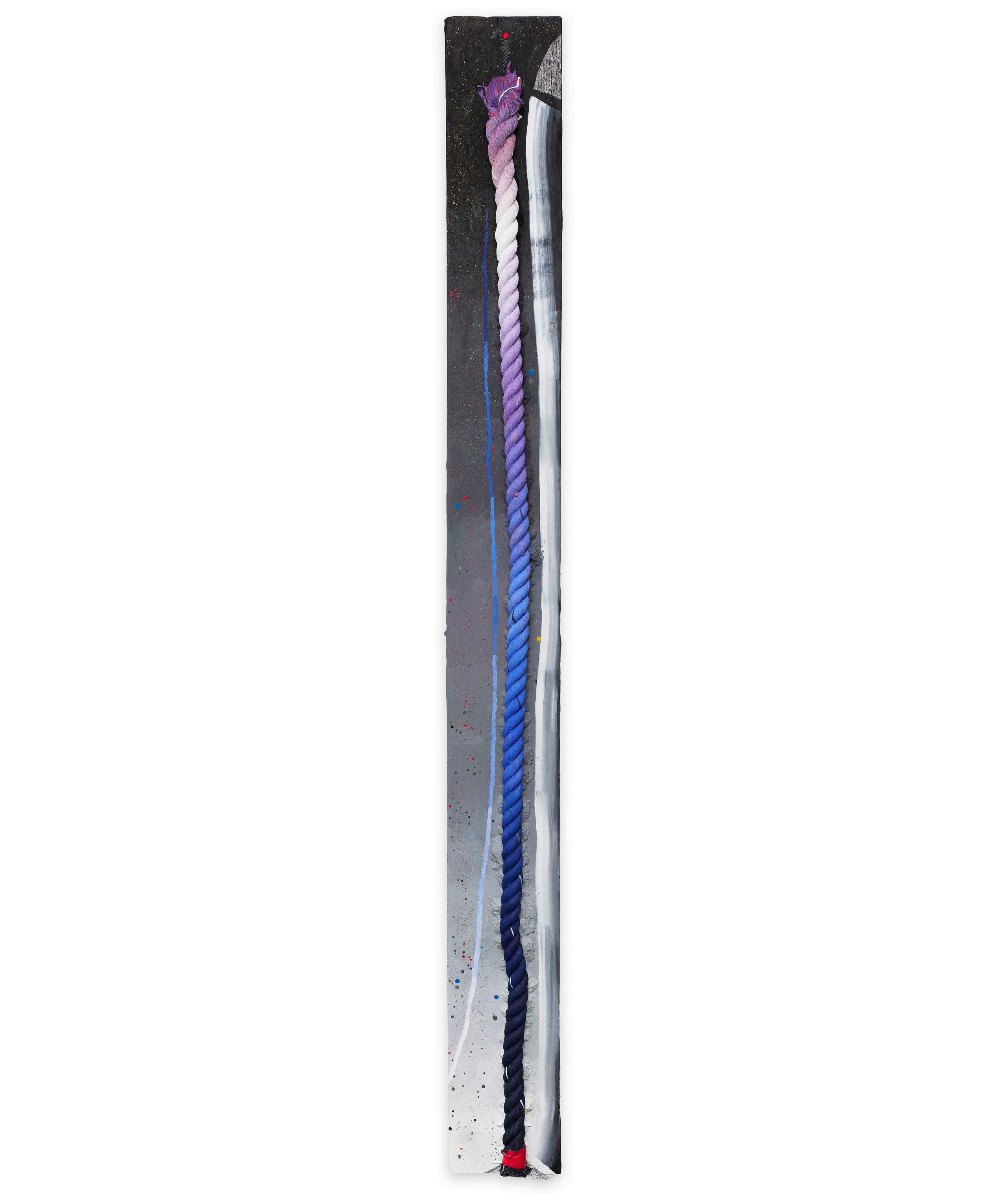
marks cover, layers layer, 2021
Oil
48 x 12 x 2 inches
121.9 x 30.5 x 5.1 cm

fragment of rest, 2023
Oil and enamel paint, graphite on cast aluminum/painted wood
30 x 20 x 2 1⁄2 inches
76.2 x 50.8. x 6.4 cm
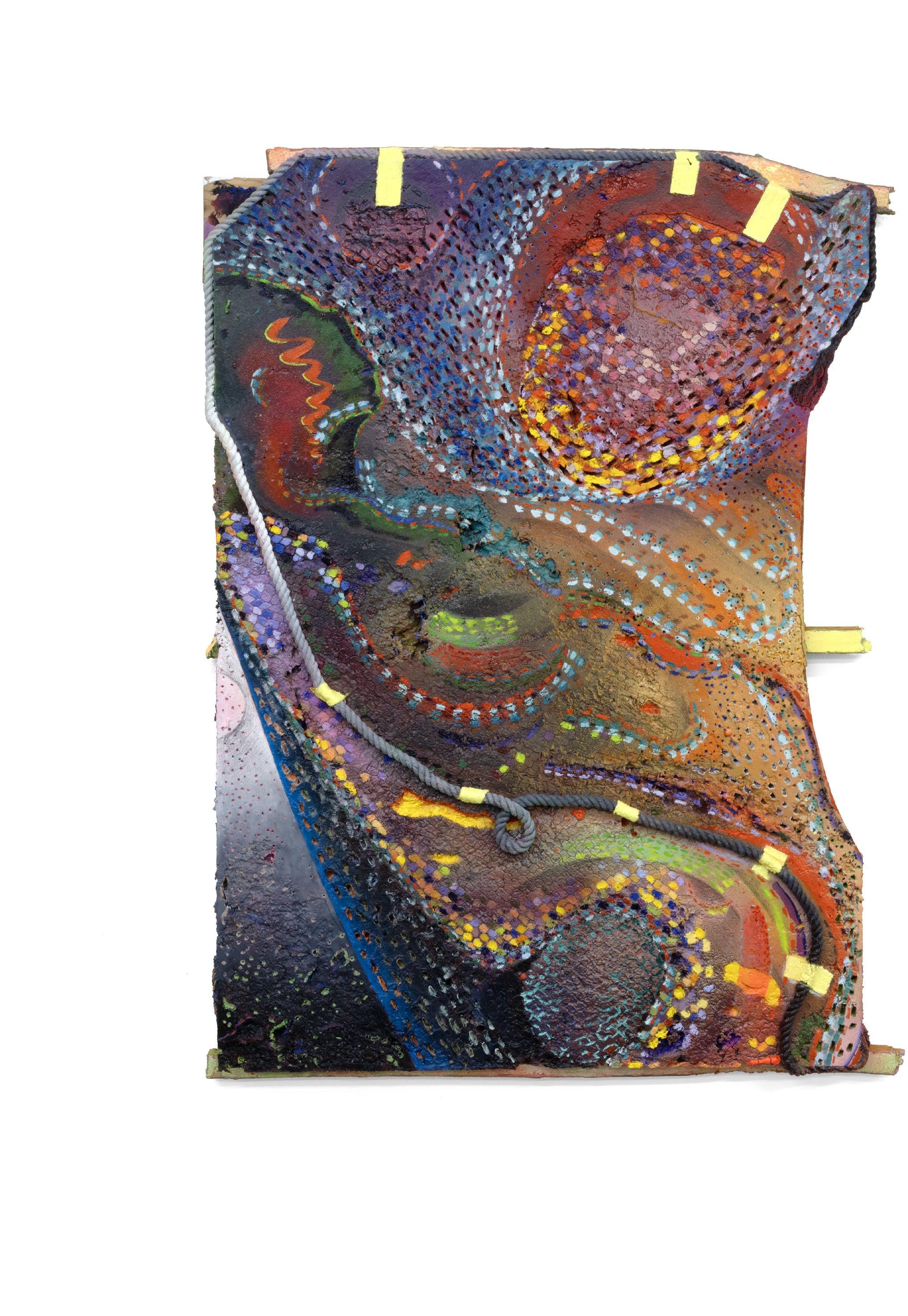
if only, if yet, 2023
Oil and enamel paint, graphite on cast aluminum/painted wood
31 1⁄2 x 30 x 2 1⁄2 inches
80 x 76.2 x 6.4 cm
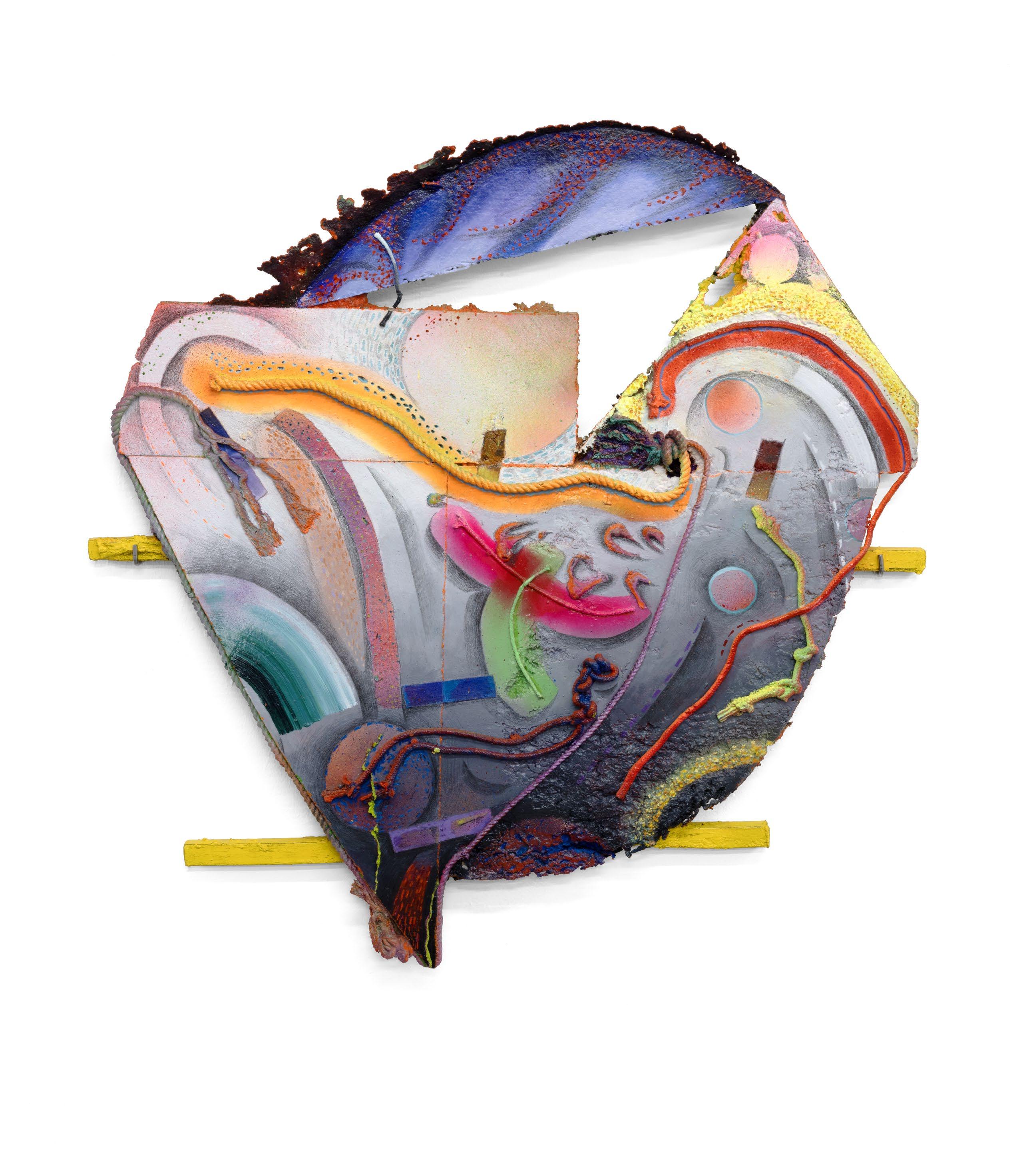
something intangible and else, 2023
40 x 38 x 2 1⁄2 inches
101.6 x 96.5 x 6.4 cm
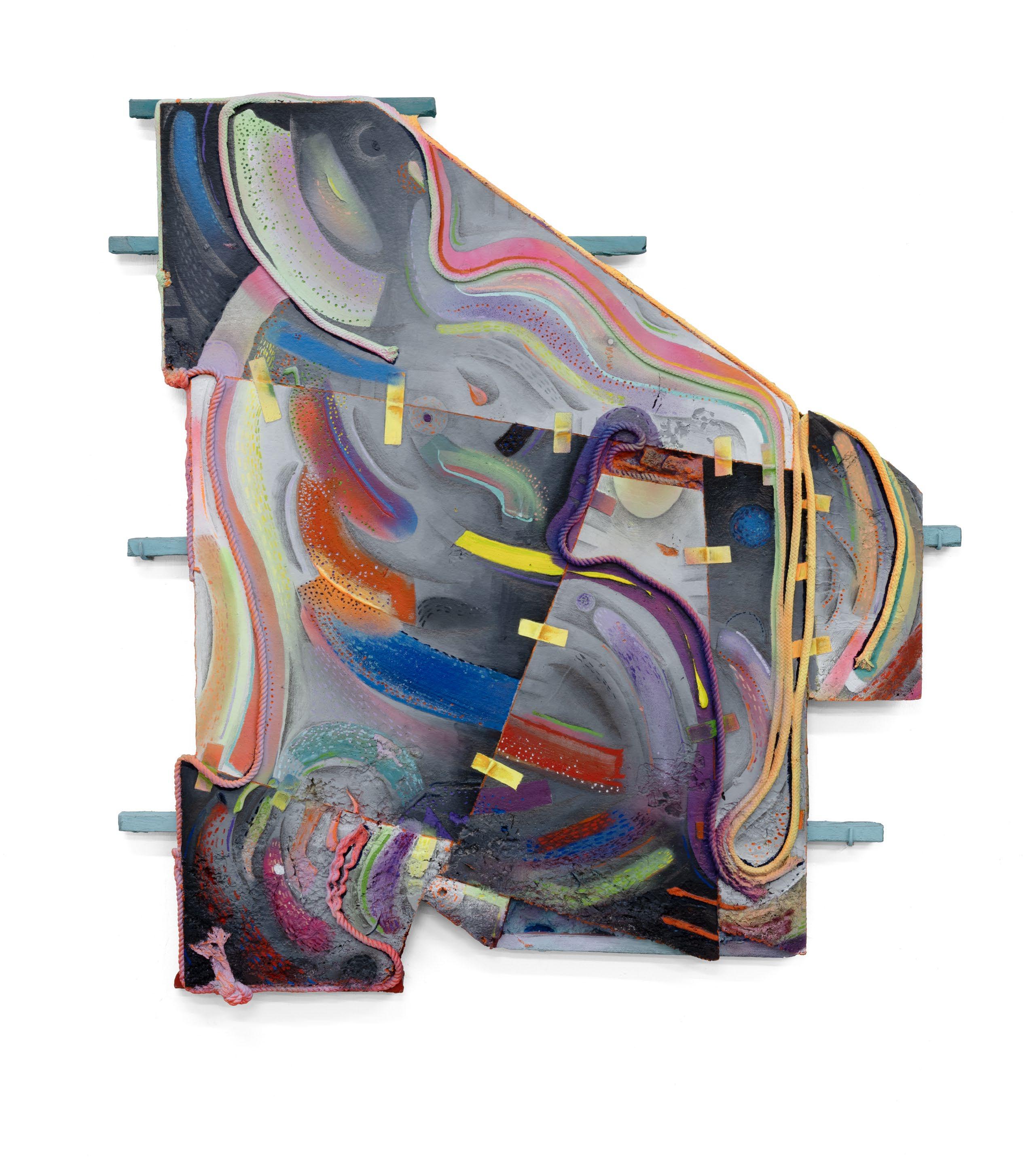
tangled, eternal motion, 2023
45 x 25 x 2 1⁄2 inches
114.3 x 63.5 x 6.4 cm

28 x 30 x 2 1⁄2 inches
71.1 x 76.2 x 6.4 cm
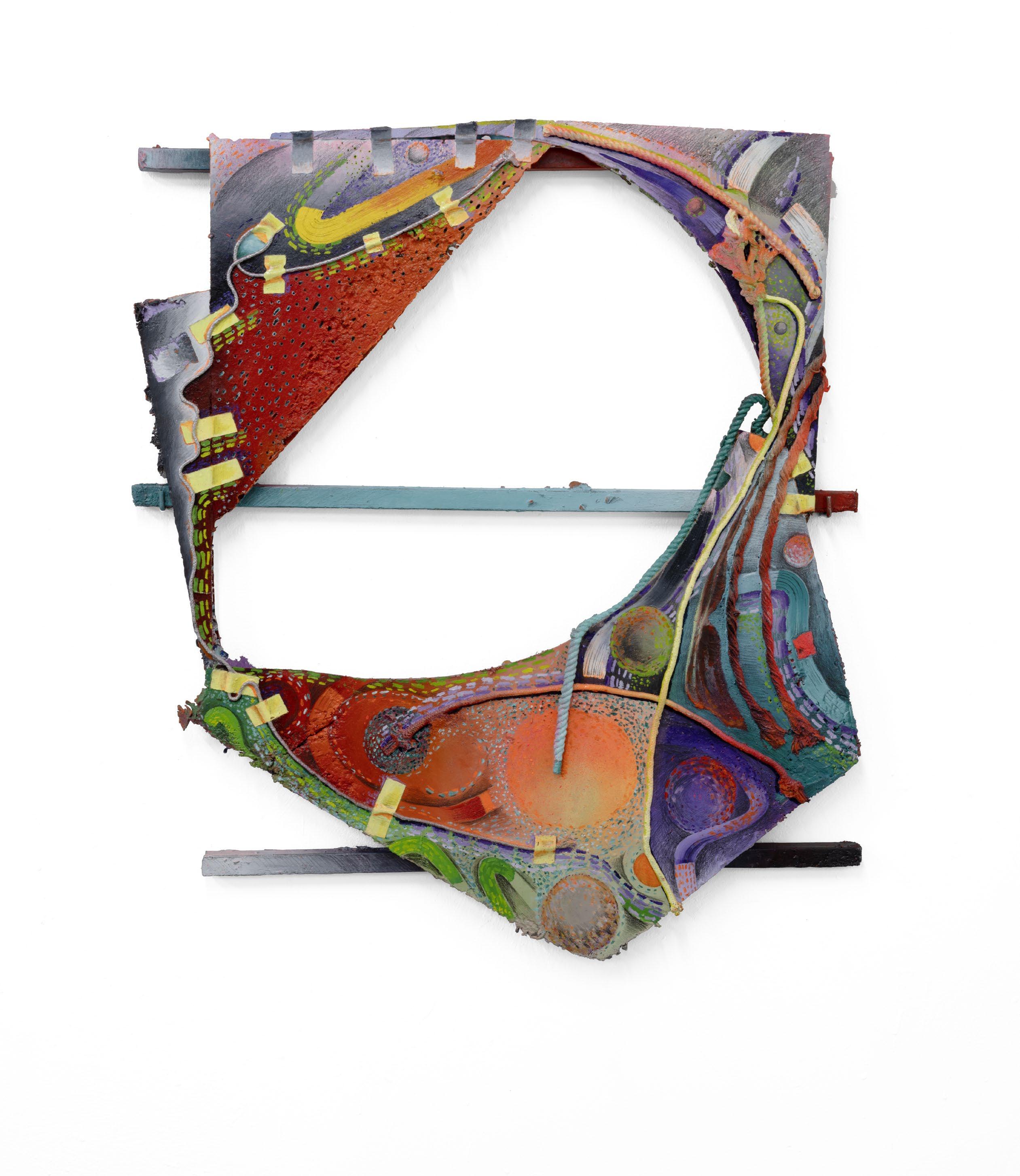
when stone entwines, 2023
Oil and enamel paint, graphite on cast aluminum/painted wood
Le panel: 40 x 31 x 2 1⁄2 inches
101.6 x 78.7 x 6.4 cm
Right panel: 40 x 31 x 2 1⁄2 inches
101.6 x 78.7 x 6.4 cm
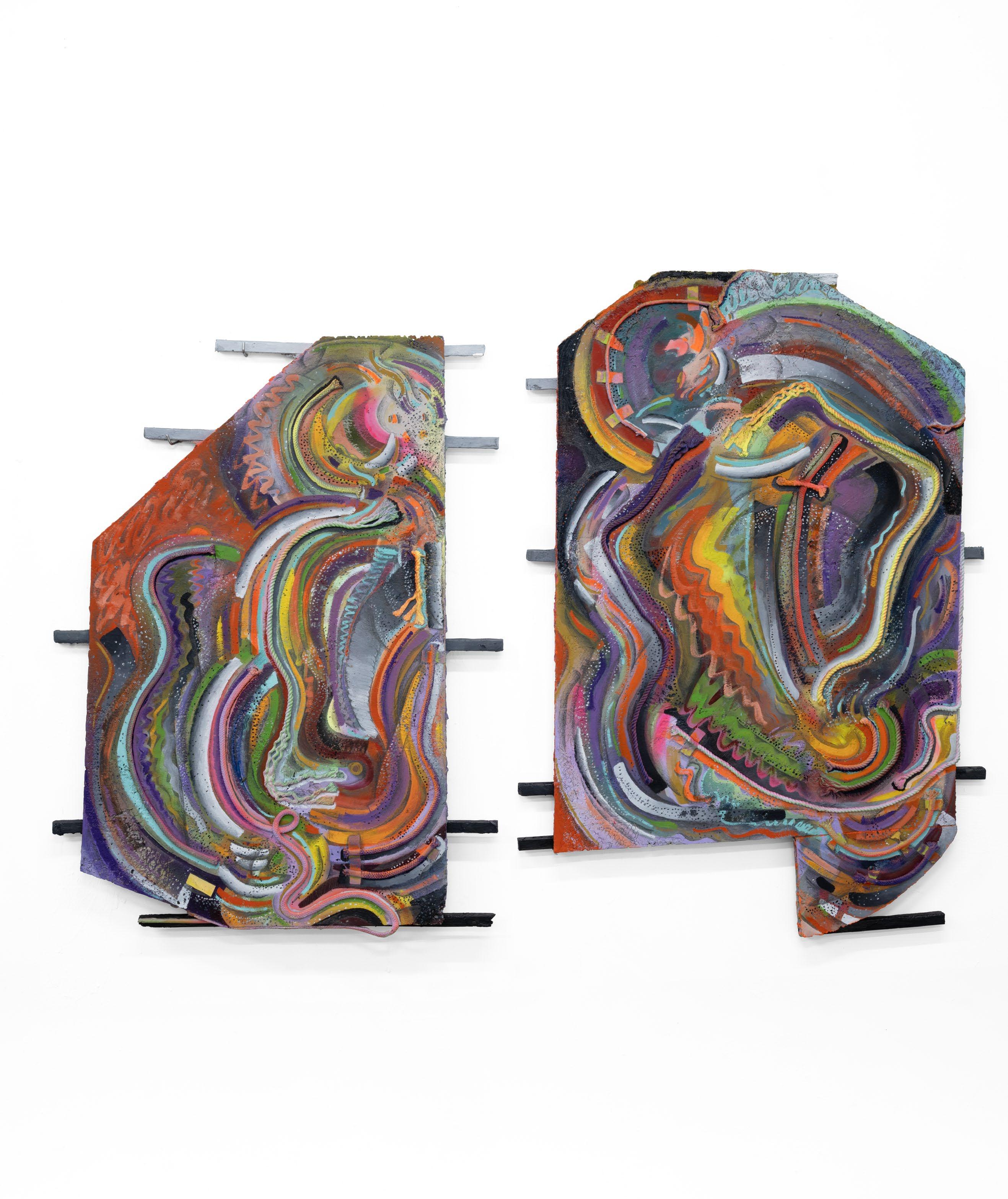
whisper to night, 2023
29 x 24 x 2 1⁄2 inches
73.7 x 61 x 6.3 cm


It all began, as if it o en does, with the line. Or rather, with the embodiment of the line, which in Katy Cowan’s case, was the rope. In 2017, Cowan created a body of work that represented a challenge to herself: to use rope to create minimal line drawings. The result were bronze casts of fibrous cables arranged in clumps, tangles, and loops, which Cowan painted brightly with oil and enamel spray paint, creating compositions that honoured the line as the foundation upon which all representation unfolds. Among them was Wheels and Scales and Spray Rope (Walking Position) (2017), a bronze cast of a long, vertical loop, with delicate, solidified spla er extensions modelled from plasticine extending from this central cable, upon which colourful blocks of paint were applied, including a section of stripes moving from black to white.
Works that followed explored how far the rope could go as a manifestation of mark making in compositions that collapse two and three-dimensions into enigmatic relief. (as listening) Position (2018), presents an entanglement of rope in various states of unravel pressed into an irregular, plasticine ground. The resulting cast invokes the delicate shape of a rectangular board dipped into acid to create irregular voids throughout—a feeling of dissolution that is amplified by the paint coating the surface to create a luminous gradation that moves from lime green and canary yellow to a hot coral pink.
Both sculpture and painting, the cast aluminium itself; as far (2019), foregrounds the line completely. The long, multi-pronged route of a series of cast ropes becomes the canvas upon which a medley of colours—greens, blues, reds—glow alongside divergent trails of graphite and greyscale. A collection of these hues appear in organic tabs on one end of the composition, recalling the colour treatments that characterise the works Cowan created while living in California amid pandemic lockdowns.
There, the artist instilled allusions to the landscape in expressive, organic geometries that utilise ropes on cardboard to create cast aluminium surfaces upon which vibrant tonal masses invoke not only the colour of the Golden State’s inimitable Redwood forests and azure Pacific coastlines, but the disasters that would befall those landscapes. Yet ridges, hills (burn and tumult) (2021), is a clump of cast rope painted the colours of an inferno. Thick, tight, twists painted burgundy appear almost intestinal; while at points, unravelled fibres form singular trails illuminated by their bright peach and white treatment over fields of graphite grey.
itself; as far is among the forms composing gods on a bridge, which foregrounds a new body of work that represents something of a departure for Cowan. Indeed, as much as the artist was surprised by how the landscape entered her work in California, the turn her work took a er moving to Berlin was equally unexpected. Daily hikes in California were replaced with walks in a city where, as Cowan observes, “images bleed out of every surface.” Observing an urban landscape defined by texture and depth—of marks layered upon marks that speak to the density of effects and affects contained within every nook—Cowan began to find Berlin’s surfaces reflecting themselves back not only in the casts she creates to paint on, but in the works on paper she produces as part of her studio practice. Where drawings once emphasised the minimalist line of a looping rope, more recent works on paper express a pointillist depth, with volume built up through staccato marks.
In turn, gouges and pock-marks began appearing on the cardboard compositions Cowan would cast into aluminium before painting them; textural references to the city’s accumulation of hardened and weathered surfaces, which bear the traces of deep geological time as much as individual and collective histories—of climate, war, modernisation, and being itself. These surfaces include the monumental figurative sculptures that represent a constant presence across Berlin. gods on a bridge alludes to a group of such figures that bu ress both sides of the Carl-Zuckmayer-Brücke at Rudolph-Wilde Park, which the artist passes daily, sculptures by Richard Guhr that depict a series of Tritons carrying a nymph each on their backs. These bodies are made of grey stone, with layers of graffiti on their bases constituting a second skin—surfaces, as with the city at large, that Cowan has abstracted for compositions which signal a move into figuration.
This move—unexpected, Cowan says—has manifested in a marked shi in the artist’s process. Where Cowan would previously create the surfaces to cast without knowing how she would work on them once rendered into aluminum, these new pieces saw the artist engage with compositional form during the initial stages of development, creating a more preconstructed image as a result. Perhaps it is in this shi where Cowan situates the figurative turn in her work, in which the stone bodies she passes everyday have manifested as sculptural abstractions and fragmented, embodied landscapes. “I’m realising that being open to the subject ma er around me made me more open to le ing the forms for the cast be dictated by that,” Cowan explains. The diptych when stone entwines is perhaps the most figurative of these new compositions—the shape of two bodies is built up with a dense and exuberant layering of tonally contrasting lines, among them, slim trails of rope that blend into Cowan’s cast and painted contours.
That sense of contouring manifests across gods on a bridge, where paint and graphite marks build volume upon cast volume to represent form as much as activity in space. Such that each work constitutes at once a fleshing out of figures as much as a mapping of movements— whether bodies in a park or city street or marks that dance across the capacious plane of representation itself. Where line, ground, and figure collapse into a vortex of intuitive becoming.
“gods on a bridge, the tangle and eternal motion of two figures entwined in daily life, bound in stone, moving through history. they are us, we are them, they are something else, intangible. Through the crevices of bent arms, arched backs, proud and humble chins, repose, strength, love, fear, disinterest, I watch the seasons change, the clouds move through them, people of Berlin coming and going – resting, reposing, drinking, laughing, and the city humming by. They remain. They are above me, they are me, they live through the city, yet they always remain out of reach.”
—Katy CowanBorn in Lake, Geneva, WI in 1982
Lives and works in Berlin, Germany
2014
MFA, Otis College of Art and Design, Los Angeles, CA
2004
BFA, University of Puget Sound, Tacoma, WA
2003
Summer Semester, Burren College of Art, Ballyvaughan, Ireland
2023
“gods on a bridge,” Miles McEnery Gallery, New York, NY
2022
“glow like stone,” Philip Martin Gallery, Los Angeles, CA
“as the sun chases the unfurling fray,” Philip Martin Gallery, Los Angeles, CA
2021
“breath shapes,” Philip Martin Gallery, Los Angeles, CA “winds glow unceasing,” Document Space, Chicago, IL
2020
“Suns Pass Flat,” Philip Martin Gallery, Los Angeles, CA “the blue sun moans,” Kate Werble Gallery, New York, NY
2017
“reflected-into-themselves-into-reflected,” Lynden Sculpture Garden, Milwaukee, WI
“On ropes and bronze…,” Cherry and Martin, Los Angeles, CA
2015
“The Studio, The Sketch,” Cherry and Martin, Los Angeles, CA
“BRICKED,” Ki redge Gallery, University of Puget Sound, Tacoma, WA
“LONGS/HAPPENS,” Green Gallery South, Oak Park, IL
“Compressional(s),” Cherry and Martin, Los Angeles, CA
2014
“Lean-Twos,” ltd los angeles, Los Angeles, CA
“Togetherers,” Bolsky Gallery, Otis College of Art and Design, Los Angeles, CA
2009
“Eyes to the Unknown,” Green Gallery, Milwaukee, WI
2008
“Gestural,” Flatfile Galleries, Chicago, IL
2007
“New Paintings,” Caro d’Offay Gallery, Chicago, IL
2023
“Pocket Universe,” Philip Martin Gallery, Los Angeles, CA
“Soulscapes” (curated by Uwe Henneken), Meyer Riegger, Berlin, Germany
2022
“We Became the River on Fire,” Los Angeles Valley College, Valley Glen, CA
“Lines of Thought: Gestural Abstraction,” Berkeley Art Museum and Pacific Film Archive, Berkeley, CA
2021
“Recent Acquisitions,” Milwaukee Museum of Art, Milwaukee, WI
“From the Collection of Anonymous,” North Dakota Museum of Art, Grand Forks, ND
“Mirages,” Crisp-Ellert Art Museum, Flagler College, St. Augustine, FL
2020
“From Within,” Philip Martin Gallery. Los Angeles, CA
“Brathwaite, Cheng, Coulis, Cowan, Dodge, Dove, Glabush, Huckby, Jorden, Luck, O’Neill, Petit-Frère,” Philip Martin Gallery, Los Angeles, CA
“Le , Right, Le , Le ,” The Green Gallery, Milwaukee, WI
2019
“Centennial: 100 Years of Otis College Alumni,” Otis College of Art and Design, Los Angeles, CA
“something of a body, of a tempo,” Et al., San Francisco, CA
“The Day in the Night,” Philip Martin Gallery, Los Angeles, CA
2018
“How They Ran,” Over the Influence, Los Angeles, CA
“Do Something To It. Do Something Else To It.,” Philip Martin Gallery, Los Angeles, CA
“EDDYSROOM @ Usable Space,” Usable Space, Milwaukee, WI
“Reunion Tour,” Andrew Rafacz Gallery, Chicago, IL
“Some of Our Favorite Things,” Ben Maltz Gallery, Otis College of Art and Design, Los Angeles, CA
2017
“As if form were some pitcher,” Fourteen30 Contemporary, Portland, OR
“Skip Tracer,” M. LeBlanc Gallery, Chicago, IL
“Irene with an I,” Woodland Pa ern, Milwaukee, WI
2016
“TOP HEAVY,” Cherry and Martin, Los Angeles, CA
The Suburban, Milwaukee, WI
“Wisconsin Triennial,” Madison Museum of Contemporary Art, Madison, WI
“PDF-Objects,” Mana Contemporary, Chicago, IL
“Jack and Diane,” Kate Werble Gallery, New York, NY
“Imperceptibly and Slowly Opening” (curated by Caroline Picard), Vox Populi, Philadelphia, PA
“Memory Theater,” Upfor Gallery, Portland, OR
“Home Improvement,” Bahamas Biennale, Detroit, MI
2015
“Try again. Fail again. Fail be er.,” Cherry and Martin, Los Angeles, CA
“Condensed Ma er Community,” Synchroton Radiation Center, Stoughton, WI
“The Great Good Place,” Threewalls, Chicago, IL
“Uncanny,” MuseuMM, Los Angeles, CA
“Imperceptibly and Slowly Opening” (organized by Green Lantern), 2337, Chicago, IL
“The Great Poor Farm Experiment VII: Listening and Making Sound,” Poor Farm, Manawa, WI
2014
“work: work,” Devening Projects, Chicago, IL
“False Scent,” 321 Gallery, Brooklyn, NY
“2732: Katy Cowan and Ross Ianna i,” Cherry and Martin, Los Angeles, CA
“The Fi h Wall,” Elephant Art Space, Los Angeles, CA
2013
“MAS ATTACK,” Torrance Art Museum, Torrance, CA
“GLAMFA (Greater Los Angeles MFA),” California State University, Long Beach, Long Beach, CA
“Come As You Are…,” Los Angeles Nomadic Division, Los Angeles, CA
“Snake Road,” Bolsky Gallery, Otis College Art and Design, Los Angeles, CA
2012
“GLAMFA (Greater Los Angeles MFA),” University of Long Beach, Long Beach, CA
2011
“Living With Them,” Roots and Culture, Chicago, IL
2010
“Agency,” Agency Gallery, London, UK
“Braided Beard,” The Hills Esthetic Center, Chicago, IL
“Love and Heartbreak,” Metro Gallery, Baltimore, MD
2009
“You Can Build a House,” The Pigeon Wing, London, UK
“Sandusky,” Caro d’Offay Gallery, Chicago, IL
2020 - 2016
Director, The Outlet Gallery, Milwaukee, WI
2017
“Water & Dreams,” Chicken Coop Contemporary, Portland, OR; traveled to Green Gallery West, Milwaukee, WI
2015
“Within and Out,” Marian Art Gallery, Milwaukee, WI
2011 - 2009
Co-Director, The Hills Esthetic Center, Chicago, IL
Art, Design & Architecture Museum, University of California, Santa Barbara, Santa Barbara, CA
Lynden Sculpture Garden, Milwaukee, WI
Milwaukee Art Museum, Milwaukee, WI
Minneapolis Institute of Art, Minneapolis, MN
North Dakota Museum of Art, University of North Dakota, Grand Forks, ND
Northwestern Mutual Insurance, Milwaukee, WI
U.S. Embassy, Maputo, Mozambique
Published on the occasion of the exhibition
gods on a bridge
16 March - 22 April 2023
Miles McEnery Gallery
515 West 22nd Street New York NY 10011
tel +1 212 445 0051 www.milesmcenery.com
Publication © 2023 Miles McEnery Gallery
All rights reserved
Essay © 2023 Stephanie Cristello
Essay © 2023 Stephanie Bailey
Director of Exhibitions
Anastasija Jevtovic, New York, NY
Publications & Archival Assistant
Julia Schlank, New York, NY
Photography by Sco Cowan, Berlin, Germany
David Robert Ellio , Los Angeles, CA
Catalogue Layout by Sean Kennedy, New York, NY
Special thanks to Philip Martin Gallery, Los Angeles, CA
ISBN: 978-0-9850184-3-6
Cover: whisper to night, (detail), 2023
